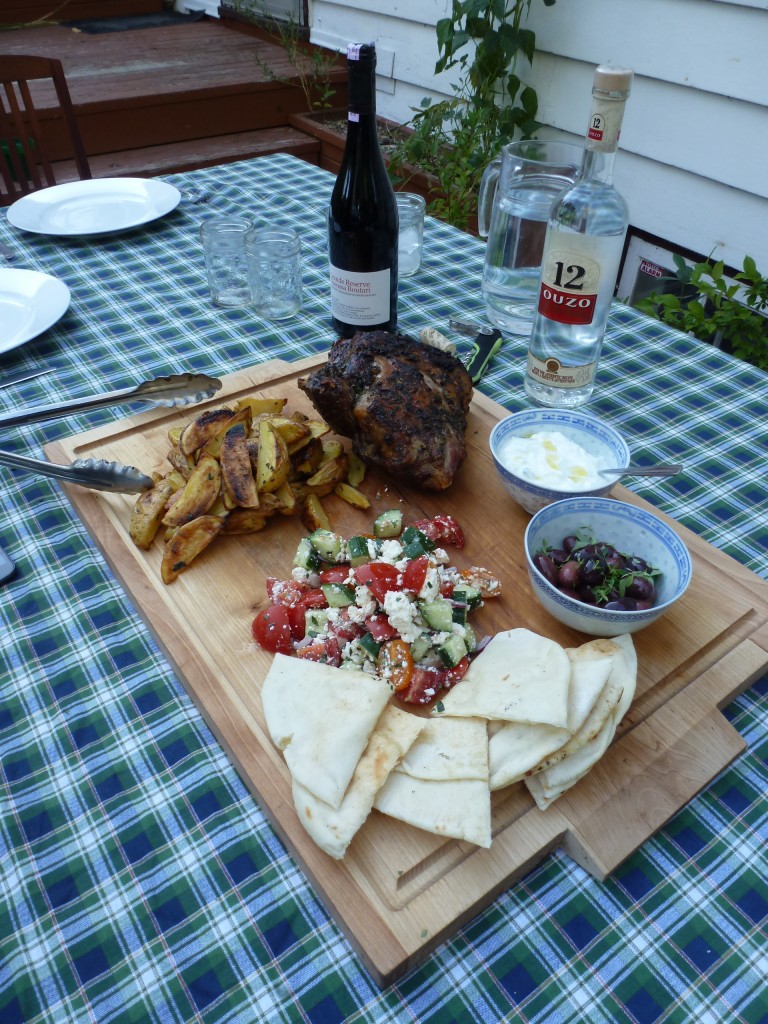Any country that pickles its national cheese in brine and adulterates its national wine with pine pitch should order dinner at the local Chinese place and save its energies for other things.
-Jeffrey Steingarten, on Greek food
As the above quote from Vogue’s food critic demonstrates, Greek food is not often taken seriously in North America.[1] In fact, a trip to a Greek restaurant is not even about the food, as the food is more or less the same at all Greek restaurants. In our part of the world, dining at a Greek restaurant is about the experience, an experience that usually involves tables for twelve, bazuki music, belly dancing, liquor, repetition of the phrase “Opa!”, smashing plates, and of course setting cheese on fire. All of this commotion invariably occurs between whitewashed walls supporting plastic grape vines.
It’s cyclical and self-perpetuating: the public has come to expect a zany, raucous, experience, so Greek restaurants deliver to make a buck, which reinforces our ridiculous idea about Greek cuisine and culture.
I haven’t done any solid research on the issue, but I’m pretty sure the initial misconception comes from a movie that is a half-century old: Zorba the Greek. Based on a Kazantzakis novel, the movie is about a stuffy half Greek half English writer who moves to Crete to run a lignite mine. In Piraeus he is approached by a Macedonian named Zorba who offers his services as a mining crew chief. Zorba: the name itself is wild. He is obsessed with women and wine and dancing and in short drinks deeply and lustily from the cup of life. This has become a stereotype throughout television and film, in everything from My Big Fat Greek Wedding to Diners, Drive-Ins, and Dives.
In the movie, Zorba is the Greek spirit teaching the prudish Englishman how to enjoy life. Interestingly in the book, both of the main characters are Greek. Zorba is perhaps the ancient Greek spirit, standing in stark contrast to his contemporary compatriots, who are all fettered by the Orthodox Church, superstition, and poverty.
But I digress.
–
The day after I wrote my last university exam I departed for a five week trip to southern Greece with my girlfriend Lisa. My degree was in electrical engineering. At the time I had a part time job in a kitchen. Our time in Greece did a lot to make me forget about engineering and work as a cook when we returned to Canada.
Before the trip I considered the word “cuisine” a fancy way of saying “food”, and to me the two terms could be used interchangeably. The trip (by which I mean the reading I did beforehand, the five weeks of travel, and the hundred or so meals Lisa and I ate in Greece, almost entirely at markets and tavernas) taught me that cuisine was a cohesive set of traditions that informed how a society interacted with the natural world.
I learned that there was a seasonal rhythm to the traditional food of Greece. One restaurant owner explained that true Greek salad is actually just raw onion, feta, and olive oil, ingredients that are available year round. Only in the height of summer were flourishes like tomatoes and cucumbers added. This seems so obvious to me now having spent the last eight years immersed in food, but at the time it was a revelation.[2]
I was fascinated to see how these traditions were interpreted differently by each taverna. Saganaki, for instance, which is essentially just fried cheese, was different in every place we ate. Sometimes it was made with kefalotiri and flamed with brandy so that the cheese melted into a gooey mat. At a beachside taverna on the island of Syros it was made with a firm local cheese called San Michiali and gently warmed in the oven, simply to heighten the aroma and flavour.
If I had to characterize Greek food I would say it is above all else simple and elemental. Your salad is tomatoes, capers, potatoes, and corn. Your dinner is fish, or octopus, and lemon, and herbs. Your dessert is melon and raki. Of course there are exceptions (one does not easily whip up a batch of baklava) but generally food is prepared with minimal intervention using simple techniques that don’t significantly alter or mask the ingredients.
Likewise meals are served without any ostentation. The entire trip I didn’t see a single belly dancer (maybe one in Plaka…) No plates were smashed. The meals were always outside, on a sidewalk or in a garden (Tamam was literally the only exception, the only time we ate indoors in an entire month). Rarely was there music playing. Our meals were quiet, humble, and (again) elemental.
–
One of the most memorable parts of our trip to Greece was the August full moon. We were staying on the island of Paros, in a small town called Dryos. For several days leading up to the lunar event the owner of our hotel told us that the August full moon was one of the greatest, most festive nights of the summer. We had absolutely no idea what to expect, and we let our imaginations run wild with visions of a beachside bacchanalia. The reality was much more restrained (we ate dinner and went out for drinks with some other tourists) but we remember it fondly.
Every full moon in August Lisa and I eat Greek food and take some time to reflect on that trip. Some years it’s just a glass of ouzo and water with some small mezze, maybe tzatziki and pita. Other times it’s a full meal, with roast lamb and wine.
Today happens to be this year’s August full moon, which is why I have Greece on the brain.
- This quote is from The Man Who Ate Everything, an article in which Steingarten tries to learn to appreciate his least favourite foods, which include (among many others) kimchi and Greek food. Here he is referring to feta, which is aged and stored in brine (not actually that weird…) and retsina, a wine from Attica that is flavoured with pine resin.
- Of course, this seasonality is a thing of the past, and whether you are in Athens Greece or Athens Ontario (look it up), and whether it is July or January, a Greek salad always has cucumber and tomato.

